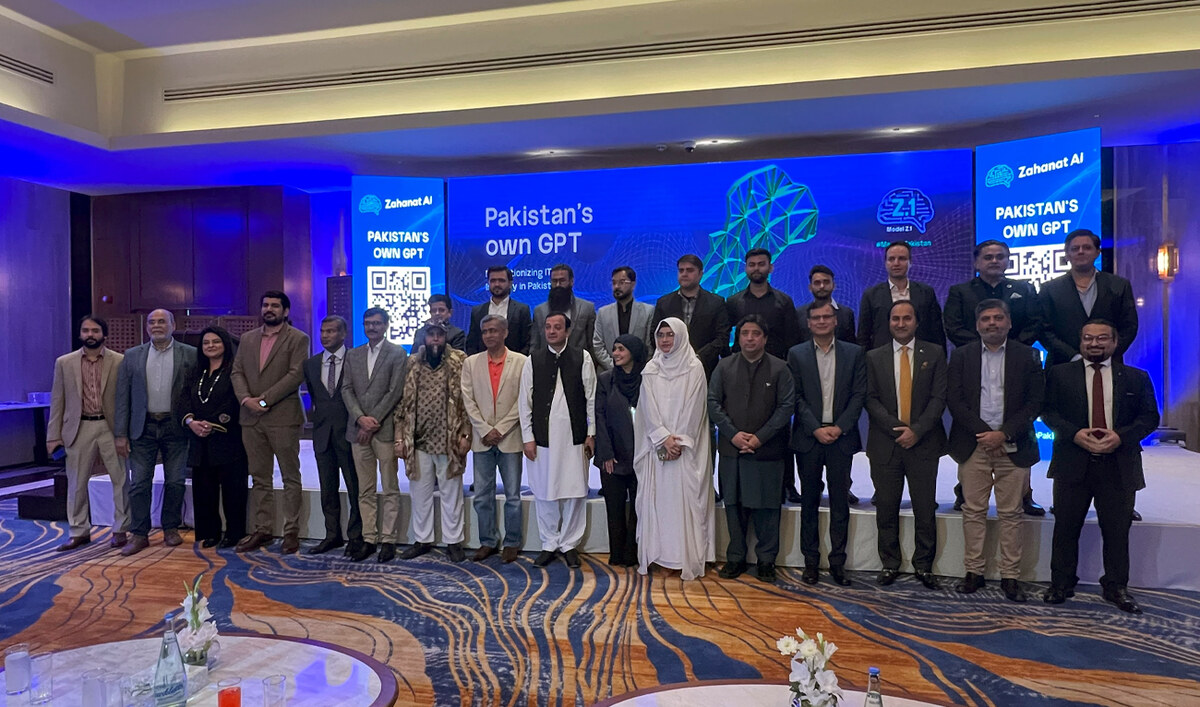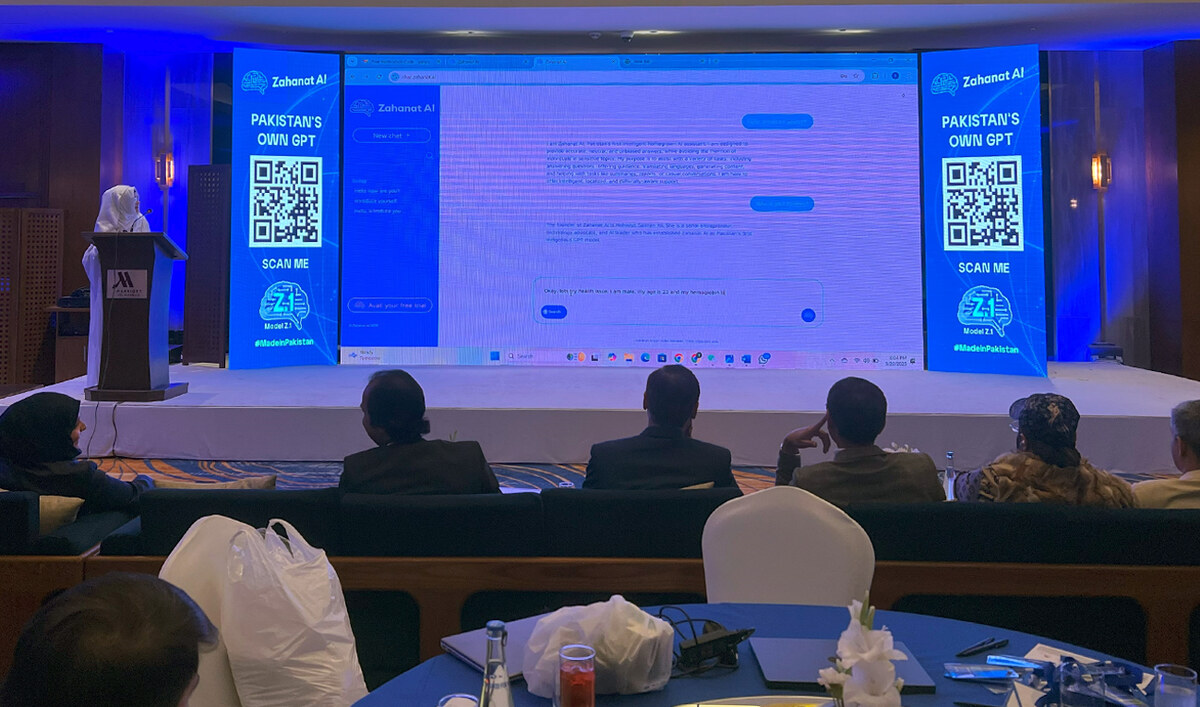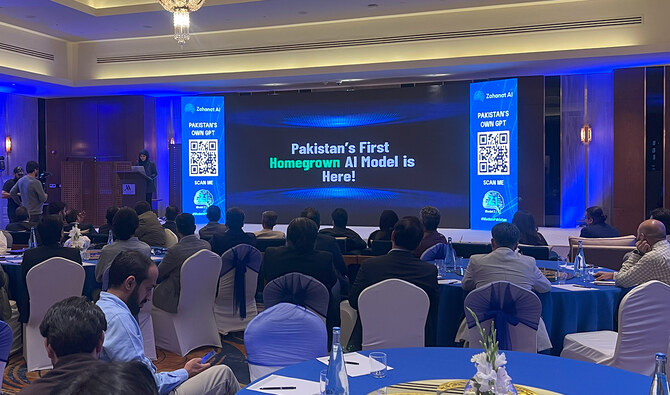ISLAMABAD: Pakistani tech firm Data Vault has launched the country’s first “home grown” generative pre-trained transformer (GPT) platform, ‘Zahanat AI,’ the company announced on Thursday, marking a significant development on Pakistan’s artificial intelligence (AI) landscape.
Zahanat AI is a text-based generative AI model that enables users to engage in human-like conversations, answer queries, and assist in various domains, according to Data Vault. The initiative aims to enhance Pakistan’s AI capabilities with locally trained models, which have been designed to fulfill regional needs.
“The problems and solution it will be providing will be according to our [Pakistani] culture and environment. So you can say it’s a local model,” Syed Muhammad Yahya, Chief Technology Officer (CTO) of Data Vault, told Arab News at the AI model’s launch at an event in Islamabad.

Officials pose for a group photo at the inauguration ceremony of Pakistan’s first “home-grown” generative pre-trained transformer (GPT) platform, ‘Zahanat AI,’ in Islamabad, Pakistan, on March 20, 2025. (AN Photo)
Generative AI refers to systems capable of creating content such as text, graphics, images, audio or video. Large Language Models (LLMs), like ChatGPT, DeepSeek and Meta-AI, are trained on large datasets to understand and generate human-like text.
Zahanat AI is a text-based generative AI model that enables users to engage in human-like conversations, answer queries and assist in various domains. The model supports English, Urdu and local languages, with plans to expand its linguistic range.
“It’s basically a general model which deals with health care, mathematics, coding, different problems, history [related queries],” the Data Vault CTO said.
The key differentiator is its hosting and local training on Pakistani culture and localized issues, which makes it equipped to address regional challenges.
“This is hosted inside Pakistan,” Yahya said. “The problems and solution it will be providing will be according to our [Pakistani] culture and environment. So you can say it’s a local model.”
Privately funded through friends and family, Zahanat AI is built on Meta’s Large Language Model Architecture (LLaMA), with 1.5 billion parameters and follows an open-source approach similar to DeepSeek.
“The development time, took around six to eight months, and we did a multi-GPU architecture [with] a stack of 12-15 GPUs,” the CTO explained.
The GPT platform is currently offering limited access only within Pakistan and Data Vault plans to soon launch its mobile application. The development comes as Pakistan moves to finalize its first AI policy, with plans to foster innovation through public-private partnerships.
“Our AI policy [is] very liberal. It actually promotes the local ecosystem [and] local entrepreneurs,” Dr. Aneel Salman, who is overseeing the upcoming National Artificial Intelligence Policy.
“In the short run, maybe after Eid or in one month’s time, we are going to have our first policy of AI.”
Dr. Salman underscored that foreign AI models posed “cybersecurity risks.”
“It’s not something new for the world to have these GPTs. We already have ChatGPT, we already have DeepSeek and other AI models which are working in terms of solving the queries,” he said.
“When I am uploading my information, it is going in their algorithms. So you don’t know how that document will later be deciphered.”
At the launch, the organizer demonstrated web application of Zahanat AI by responding to queries relating to health care and mathematics, however, the GPT model’s response to a query about freelancing trainer Hisham Sarwar, who was present at the launching event, initially lacked specific details and later contained inaccuracies.

Organizers demonstrate the web application of Zahanat AI Pakistan’s first “home-grown” generative pre-trained transformer (GPT) platform, during its inauguration ceremony in Islamabad, Pakistan, on March 20, 2025. (AN Photo)
Dr. Salman acknowledged these limitations.
“When ChatGPT came first, it also had its problems. When DeepSeek came, it also had problems during testing,” he said. “I’m not saying that Zahanat [AI] is going to be a perfect product. If there are problems in it, then your Z1, Z2, Z3 models will come.”
Despite the breakthrough, experts believe public adoption is crucial for the Pakistani GPT model.
“If we want to prevent them [Zahanat AI] from losing like we’ve seen with some previous initiatives, what we need to do is that we use more of their technology,” said Prof. Dr. Yasar Ayaz, chairman of the National Center of Artificial Intelligence (NCAI).
“Companies like Zahanat AI need to come in contact with innovators, for example, who are working in different R&D setups in Pakistan, to jointly develop groundbreaking stuff which can actually revolutionize the AI game in Pakistan.”



















